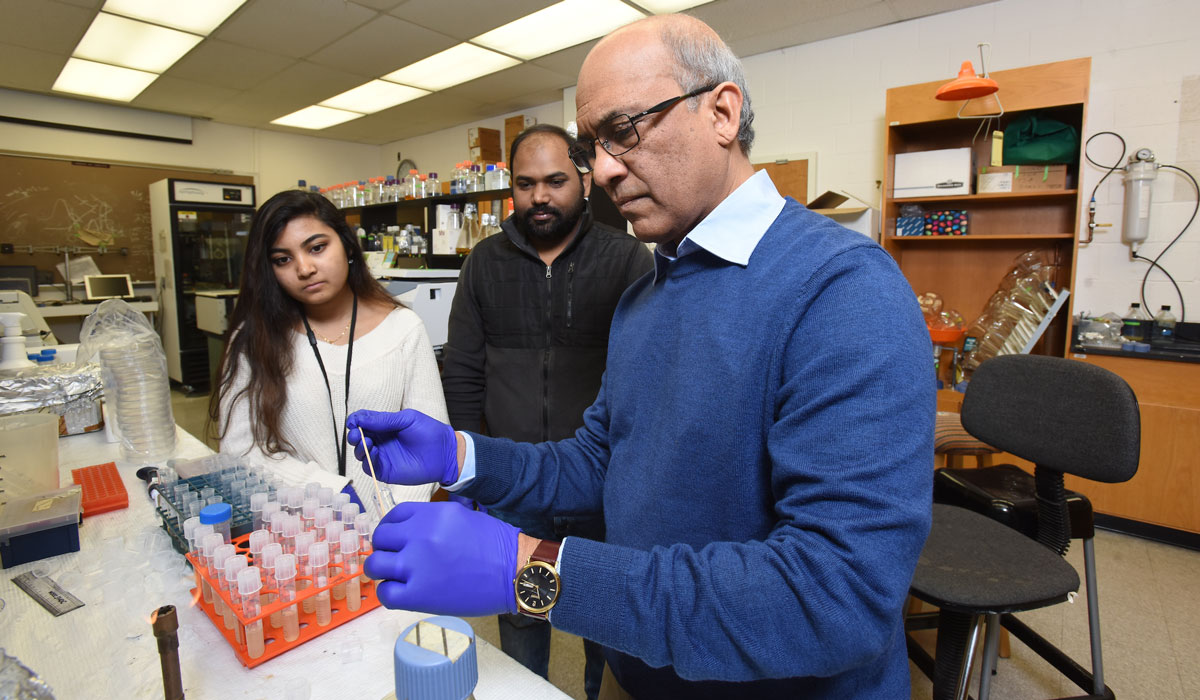

Catholic University will offer royalty-free licenses to the vaccine delivery-related patents resulting from the work of Venigalla Rao, a leading expert on viruses and vaccine development, to research teams hoping to curb the global pandemic.
UPDATE: The royalty-free license offer mentioned here expired upon the rollout of viable Covid-19 vaccines and is no longer available. The purpose of the offer was to facilitate the timely development of a vaccine, and that purpose has now been achieved.
For more than 30 years, Catholic University biology professor Venigalla Rao has been leading a multidisciplinary research program to examine how viruses themselves can be used to develop vaccines and cure diseases, including HIV or cancer. As the director of Catholic University’s Center for Advanced Training in Cell and Molecular Biology, he is among the world's top experts on viruses and associated biomedical applications such as vaccine development and genetic therapies.
Now, with the rapid onset of the COVID-19 global pandemic caused by the coronavirus SARS-CoV-2, Rao and his team of researchers are hoping that his research can help lead to a possible coronavirus vaccine. The team has ramped up work in the laboratory to rapidly generate potential vaccine candidates against the novel coronavirus and test their effectiveness in an animal model.
Catholic University has received a number of U.S. and international patents on Rao’s technology. Beginning this week, it will offer non-exclusive, royalty-free licenses to patents pertaining to Rao’s work on bacteriophage T4 virus platform and vaccine delivery systems. These licenses will provide access to the University’s intellectual property on the subject for any researchers working on a coronavirus vaccine, so long as they obtain a license from the University and agree to specific terms and conditions.
“The work that resulted in these patents, led by Dr. Rao and funded by federal, corporate, foundation, and internal sources, has shown applicability to design potential vaccines against deadly infectious agents,” said Ralph Albano, vice provost for research.
"The decision to release non-exclusive, royalty-free licenses to the University’s T4 patent portfolio for use in a possible COVID-19 vaccine was made in keeping with the tradition and expectations of the Catholic Church to provide the compassion of Christ to those in need. It is our hope that by taking advantage of this research, those with more extensive prior experience with Coronaviruses, in particular, can jumpstart a development effort that will lead to a quicker solution to the worldwide pandemic.”
"As a global Catholic research university faithful to the Church, this is what we do,” said University Provost Aaron Dominguez. “Our fundamental discoveries and subsequent applications are not hindered by our ethics and respect for the human person, but accelerated in the right directions by them."
“This is what science is supposed to be,” Professor Rao said. “You do basic research to get a glimpse of the truth of nature at the subtlest level possible – for biologists it is at the atomic level – but you always keep an eye on how we could potentially use this research to benefit society. I think as scientists, that’s part of our responsibility.”
Research of the ‘Highest Quality’
Rao and his team have conducted research on a wide range of topics, from the basic mechanisms of viral DNA packaging to anthrax and plague vaccine, atomic structures of molecular machines, and CRISPR genome editing. What links these varied projects, he says, is one underlying goal: “to learn about the basic mechanisms of a virus at the deepest level possible and apply this knowledge to redesign the virus for beneficial purposes.”
“Viruses have probably evolved over millions of years, so that they can efficiently enter our cells and use them as factories to produce new viruses. This makes us sick and is sometimes deadly,” Rao says of his and his team's principal focus, which revolves around bacteriophage T4, a benign virus. “We are trying to program the viruses in a test tube such that they can enter our cells but perform specific tasks or repairs that benefit us rather than infect us.”
Rao’s lab, which consists of a team of postdoctoral fellows, undergraduate and graduate students, has been recognized with high-level research grants from the National Science Foundation (NSF) and National Institutes of Health. In 2018, Rao’s development of a novel biodefense vaccine that protects against both anthrax and plague was featured in Newsweek magazine.
“The work done by Dr. Rao and his lab has consistently been of the highest quality,” Albano said. “His ability to continue to receive grants from the most competitive funding programs has been remarkable, and his work continues to provide the University and our students with a valuable example that demonstrates world class research and education.”
Anyone interested in pursuing development work using these patents should contact the Catholic University Office of Technology Transfer by email at CUA-techtransfer@cua.edu or by phone at 202-319-5218.